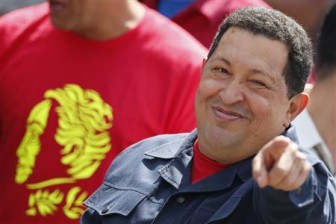SABANETA, Venezuela, (Reuters) – In 2010, late socialist leader Hugo Chavez knelt down in the backyard of his childhood home in Venezuela’s lush plains to plant an orange tree named ‘revolution’ as red-shirted supporters cheered and cameras flashed.
During a song-and-dance commemoration of Chavez’s birthday last year, his successor Nicolas Maduro sowed another orange tree in the same garden.
The trees, though, have fallen ill, their leaves shriveled.
“They have some sort of infestation,” tour guide Ana Hidalgo said in the sun-doused yard behind Chavez’s former house, whose walls are now laden with photos, quotes, and even his old hammock.
Just like its botanical namesake, the movement Chavez called “The Beautiful Revolution” is ailing ahead of Dec. 6 legislative elections – including in Sabaneta, his sleepy hometown in Venezuela’s agricultural heartland.
Over a decade of increasingly dysfunctional state controls and the end of an oil bonanza have triggered one of the OPEC nation’s most severe economic crises.
Just blocks from where Chavez grew up and sold his grandmother’s papaya sweets to make ends meet, Venezuelans now line up for hours hoping a truck will make its way across the palm tree-sprinkled flatlands to deliver scarce rice or toilet paper.
Rampant inflation and the near-collapse of the bolivar currency have destroyed salaries, while violent crime leads many to barricade themselves inside when the region’s vast sky turns dark.
 “We were ‘Chavistas’,” said Julio Coromoto, 57, a workman next to a queue of dozens at a shabby supermarket.
“We were ‘Chavistas’,” said Julio Coromoto, 57, a workman next to a queue of dozens at a shabby supermarket.
“But they destroyed this town.”
Nationwide polls predict voters will punish the socialists next month, possibly taking away their majority in the National Assembly for the first time since Chavez took power in early 1999.
To hold on to loyalists, the government is milking Chavez’s legacy at every turn, re-naming voting centers after him, splashing his smiling face on billboards and filling state television with his most rousing speeches.
In Barinas, his brother Argenis and cousin Asdrubal are running for the legislature, hoping to follow in the political footsteps of two other brothers, Adan and Anibal, already Barinas governor and mayor of the municipality whose capital is Sabaneta.
But with adversaries accusing the family of corruption, many people now scorn the state’s most famous surname.
“Now there are more Chavez’ on their way? That means more for them. And what’s left for the people? Nothing! I’m embarrassed to say I’m from here,” said Zulay Chacon, 26, once a government supporter, after nine hours in line.
‘CHAVISTA AT HEART’
In muggy state capital Barinas, Governor Adan and candidate Argenis sang traditional ‘joropo’ songs, which the folksy Chavez would often croon to supporters, at an “anti-imperialist women” rally last week.
“This one is for Chavez! Viva Chavez!” Adan exclaimed to cheers from the dozens dancing. “Viva Maduro!” he then added, his enthusiasm and the cheers both slipping.
“Chavismo” still elicits devotional following among some poor Venezuelans who laud the house giveaways, free education, and subsidized food he championed. The wealthy elite that came before, they say, only looked after their own.
Yet the personality-driven movement has suffered since Maduro, an uninspiring former bus driver and union leader, took office in 2013, with crowds now a shadow of the thousands who would throng to hear the magnetic Chavez speak.
Activists repeat the official line that a malicious business-led opposition is waging an “economic war” to discredit socialism.
“The opposition is hiding our things, our sanitary pads, our soap,” said state bookstore employee Carmen Serrano, 23. “But despite the situation, we’re going to win. I’m ‘Chavista’ at heart.”
While an unshakable core stood firm, just a block from the rally raged one of Venezuela’s most palpable emotions these days: fury.
“Rats! Sixteen years of this and my wallet is empty!” yelled taxi driver and former Chavez supporter Dulce Velasquez, 53, as she and a small group banged pots and pans together in a traditional Latin American protest.
Velasquez has not worked for four months because she cannot find spare car parts. Her partner was killed during a recent robbery. There is barely running water at home anymore.
“I’ll be lining up as of Dec. 4 to vote, don’t even try to get rid of me!”
Venezuela’s opposition is counting on voters like Velasquez to recoup Barinas, where five of the state’s six legislators are socialists.
At a national level, the ruling party has a strong record of getting its supporters out to vote. Critics say it has also manipulated electoral districts to improve its chances and controls the media and electoral authorities.
But the opposition clearly feels this is its best chance to weaken “Chavismo.”
In Barinas, critics contend the once poor Chavez clan behaves like a royal family, buying up large ranches and wielding undue influence.
State lawmakers have filed over 200 complaints to the comptroller’s office in around two years, said opposition state legislator Simon Archila, leafing through a folder filled with denunciations. No charges have been filed.




